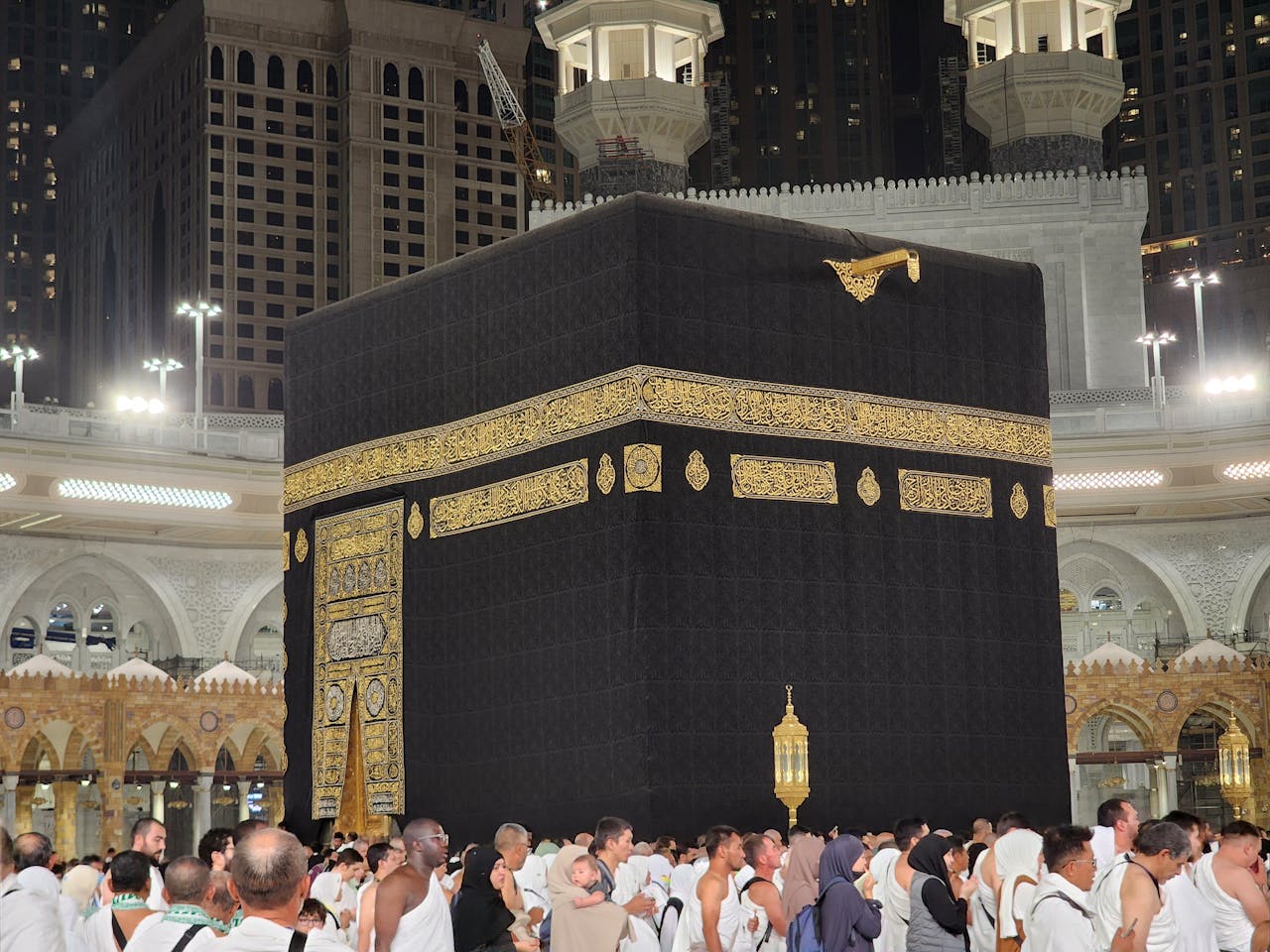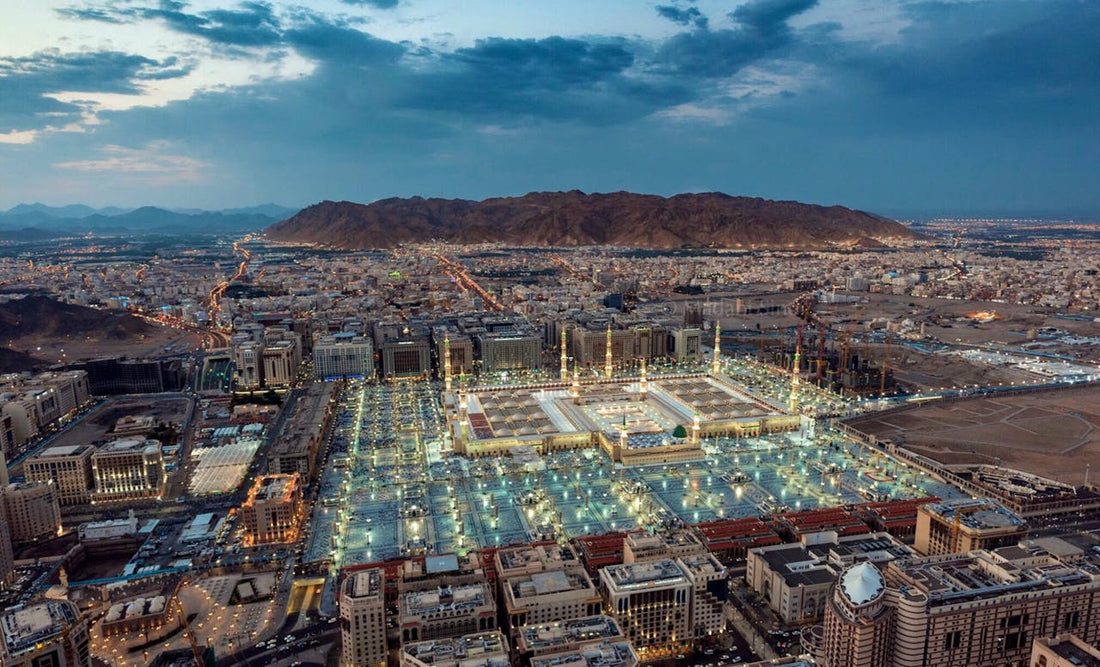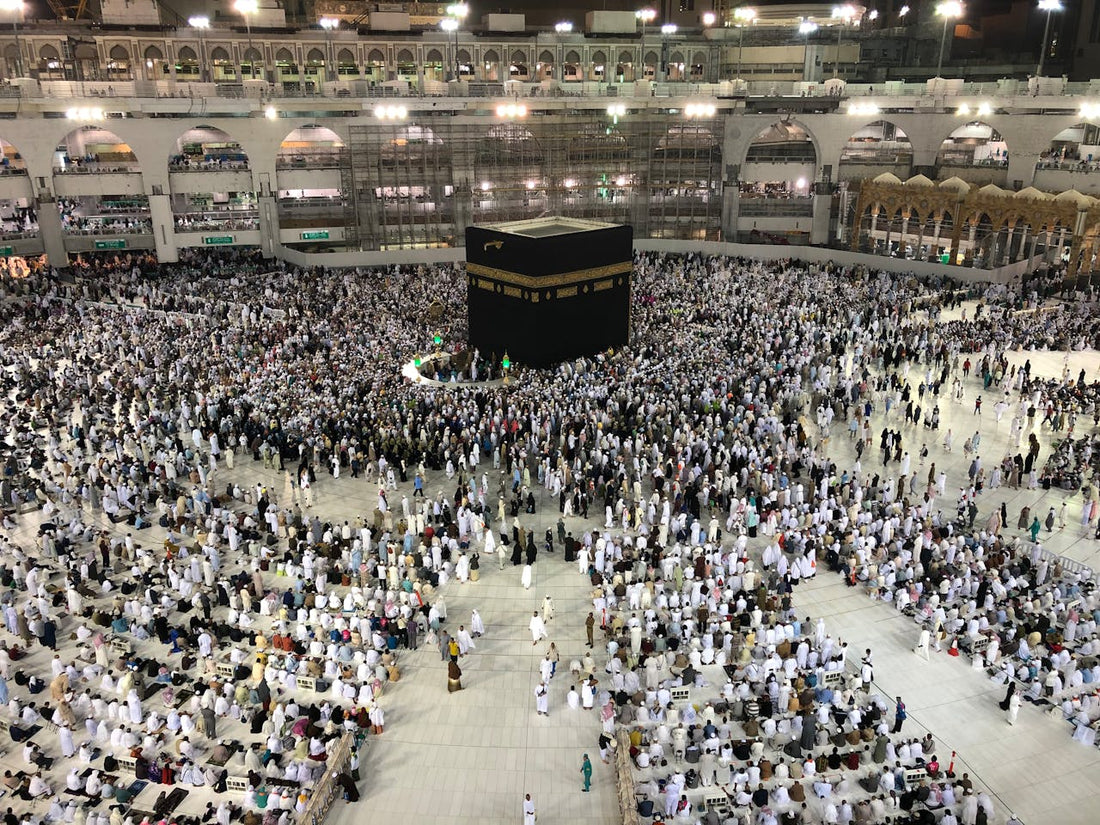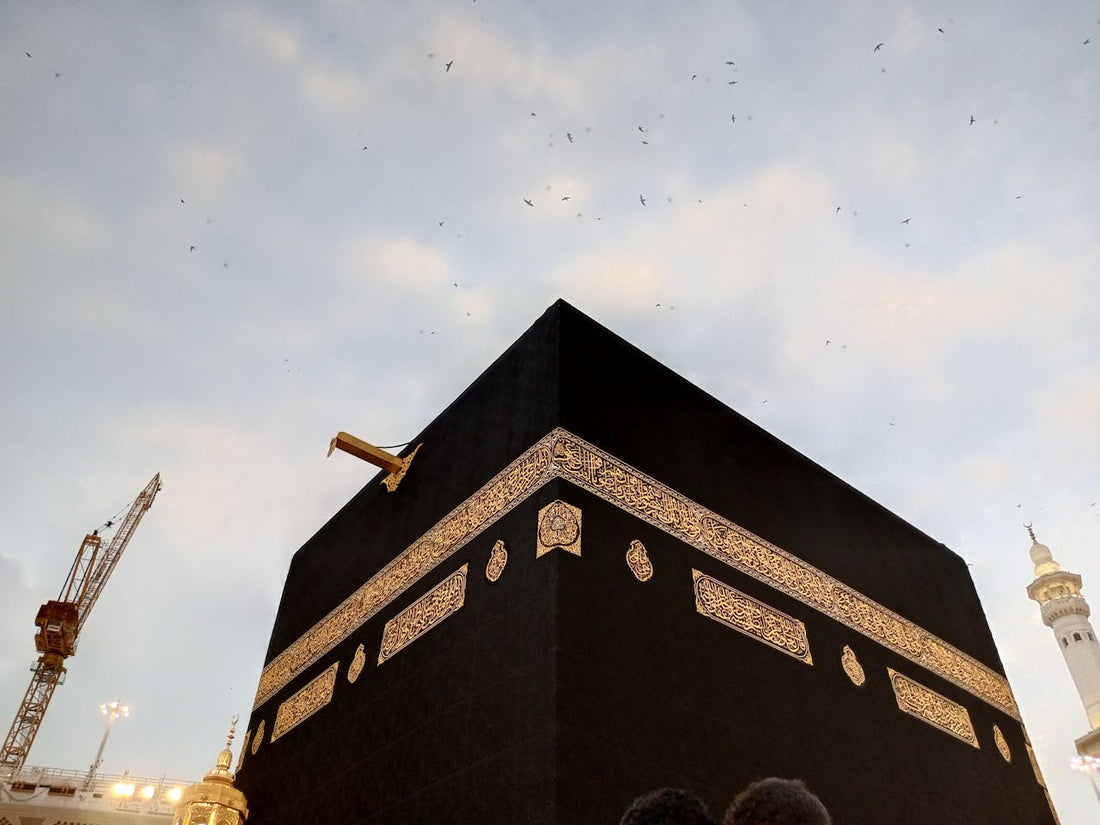The Talbiyah is one of the most spiritually powerful statements a Muslim can say during Hajj and Umrah.
It begins with the beautiful phrase:
“Labbaika Allahumma Labbaik”: “Here I am, O Allah, here I am.”
This proclamation expresses full submission, love, and readiness to obey Allah (سُبْحَانَهُ وَتَعَالَىٰ). It is repeated aloud by the pilgrim as they enter the sacred state of Ihram, heading toward the holy sites in Makkah.
Reciting the Talbiyah reminds the heart that this journey isn’t just physical — it’s a call from Allah (سُبْحَانَهُ وَتَعَالَىٰ) that the pilgrim is responding to with sincerity. It revives the sense of commitment, humility, and unity with millions of fellow believers.
In this blog, we’ll cover what the Talbiyah means, how to say it, when to recite it, and its deep value in the lives of those performing Hajj or Umrah.
What Is Talbiyah in Umrah and Hajj?
The Talbiyah is a sacred chant and declaration that Muslims begin to recite after entering into the state of Ihram. It marks the start of the rites of Umrah or Hajj.
The word “Talbiyah” comes from the root labbā, meaning “to respond.” So when a pilgrim says Labbaik, they are answering the call of Allah (سُبْحَانَهُ وَتَعَالَىٰ).
The Prophet Muhammad (صلى الله عليه وسلم) would say the Talbiyah when starting Hajj or Umrah, and his companions followed his example. The words are full of meaning, as they declare the pilgrim’s presence, devotion, and recognition of Allah’s oneness and blessings.

How to Recite the Talbiyah Dua?
The Talbiyah should be recited aloud by men and quietly by women. It is part of the niyyah (intention) for the pilgrimage.
It is Sunnah to repeat it often while walking, sitting, riding, and entering the sacred areas of Makkah.
Before reciting Talbiyah, the pilgrim must have already entered Ihram and made the intention for Hajj or Umrah.
From that point on, Talbiyah becomes a constant reminder that the journey is for Allah (سُبْحَانَهُ وَتَعَالَىٰ) alone.
Talbiyah Dua
This is the complete Arabic, English translation, and transliteration of the Talbiyah:
Arabic:
لَبَّيْكَ اللَّهُمَّ لَبَّيْكَ، لَبَّيْكَ لَا شَرِيكَ لَكَ لَبَّيْكَ، إِنَّ الْحَمْدَ وَالنِّعْمَةَ لَكَ وَالْمُلْكَ، لَا شَرِيكَ لَكَ
Translation:
“Here I am, O Allah, here I am. Here I am, You have no partner, here I am. Verily, all praise, grace, and sovereignty belong to You. You have no partner.”
Transliteration:
Labbaika Allahumma labbaik, labbaika laa shareeka laka labbaik, innal-hamda wan-ni’mata laka wal-mulk, laa shareeka lak.
This beautiful chant summarizes Tawheed (oneness of Allah), gratitude, and humility. It is one of the most beautiful and powerful phrases in Islam.
How Do You Pronounce Talbiyah
The word Talbiyah is pronounced: Tal-bee-yah.
For non-Arabic speakers, proper pronunciation matters. Listening to recordings of the Talbiyah by imams or teachers can help. If you are learning Talbiyah in Urdu, many audio guides are available that break the words down syllable by syllable.
You don’t need to be perfect, because Allah (سُبْحَانَهُ وَتَعَالَىٰ) rewards the effort. What matters most is your sincerity.
When Do You Recite the Talbiyah Dua?
You begin reciting the Talbiyah right after entering the state of Ihram and making your intention for Hajj or Umrah. After that, you continue to recite it:
- While traveling towards Makkah
- When entering the Masjid al-Haram
- Upon beginning the rituals like Tawaf
- After every Salah
- When ascending or descending hills
- Anytime your heart turns to Allah (سُبْحَانَهُ وَتَعَالَىٰ) during the pilgrimage
It is stopped when the pilgrim starts Tawaf for Umrah or when they throw the first stone at Jamrat al-Aqabah during Hajj.
How Long Does it Take o Recite Talbiyah?
Reciting the full Talbiyah takes about 20 to 30 seconds, depending on the speed and clarity. Many pilgrims recite it repeatedly while walking or waiting.
The repetition keeps the heart focused and connected to the purpose of Hajj or Umrah.
During travel, while riding transport or walking, pilgrims often chant it in groups.
The words echo in unison, creating a sense of unity and devotion that is both humbling and powerful.
Is it Compulsory to Recite Talbiyah?
Reciting the Talbiyah is not a pillar of Hajj or Umrah, but it is a confirmed Sunnah and highly emphasized.
Scholars agree that it is Sunnah Mu’akkadah, i.e., an established practice of the Prophet (صلى الله عليه وسلم).
If someone forgets or is unable to recite it due to illness or other reasons, their Hajj or Umrah is still valid.
But it is highly recommended to say it often, because it is the verbal declaration that one is responding to the divine invitation.
What Are the Benefits of Reciting Talbiyah?
- There are many benefits to reciting the Talbiyah during Hajj and Umrah. Here are three important ones:
- It is a sign of acceptance: You are responding to Allah’s (سُبْحَانَهُ وَتَعَالَىٰ) call to visit His house. Saying Labbaik is your answer to His invitation.
- It purifies the heart: Repeating Talbiyah reminds you that all praise and blessings belong to Allah. It humbles the ego and strengthens sincerity.
- It brings reward: Every repetition is an act of worship. Angels record it, and the Prophet (صلى الله عليه وسلم) said there is no Muslim who raises his voice with Talbiyah except that every stone, tree, and clump of earth to his right and left responds with him.
Hadiths Regarding Talbiyah
The hadiths about Talbiyah show how much the Prophet Muhammad (صلى الله عليه وسلم) valued this chant.
“The Prophet (صلى الله عليه وسلم) said: ‘There is no Muslim who recites the Talbiyah but that whatever is to his right and to his left — stones, trees, and hills — recite it with him until the end of the earth.’”
“Jibreel came to me and told me to order my companions to raise their voices with Talbiyah.”
“Whoever performs Hajj for Allah’s sake and does not commit any sin or foul speech, will return as free of sin as the day his mother gave birth to him.”
These hadiths highlight the spiritual impact of Talbiyah during the pilgrimage.
Frequently Asked Questions (FAQs)
What does labaik mean?
It means “O Allah, here I am”: it shows your full presence and obedience in answering Allah’s call.
Can I say Talbiyah without wudu?
The Prophet (صلى الله عليه وسلم) performed Tawaf seven times around the Kaaba. This number was practiced and taught, and scholars agree it is a specific ritual, not symbolic alone. It follows the exact Sunnah of Hajj and Umrah.
Can I do Umrah for my dead relatives (father/mother/grandparents/siblings)?
Yes. Performing Umrah on behalf of a deceased loved one is allowed and recommended if you’ve already performed your own. The Prophet (صلى الله عليه وسلم) approved doing Hajj and Umrah for others as a form of sadaqah (charity).
What is the difference between Takbeer and Talbiyah?
Takbeer is saying “Allahu Akbar” (Allah is the Greatest), often used during Eid ul Fitr and daily prayer. Talbiyah is the specific chant said during Hajj and Umrah, starting with “Labbaik Allahumma Labbaik.”
Is Talbiyah of a Surah or a specific prayer?
No, Talbiyah is not part of any Surah in the Qur’an. It is a dua and declaration used during pilgrimage.
Is there a version of Talbiyah in Urdu?
While Talbiyah is best recited in Arabic, there are Talbiyah in Urdu guides that help non-Arabic speakers understand the meaning.
What invalidates your Umrah?
Major violations like engaging in sexual relations before Tahallul (release from Ihram), not completing Tawaf or Sa’i, or skipping Ihram completely. Also, violating the Ihram rules intentionally may require a dam (penalty).
Summary - Talbiyah
The Talbiyah is a powerful statement of submission, love, and obedience to Allah (سُبْحَانَهُ وَتَعَالَىٰ). Pilgrims chant it to show their readiness to answer His call and fulfill their religious duties.
Whether recited at the Miqat, during Tawaf, or while walking between the mountains of Safa and Marwah, the Talbiyah centers the believer’s focus on sincerity and humility.
Its meaning reflects devotion and a clear acknowledgment that all blessings belong to Allah alone, including the sacred opportunity to perform Hajj or Umrah.
To summarize:
- Talbiyah is a mandatory and highly rewarding chant for pilgrims in the Ihram.
- Its recitation marks a pilgrim’s conscious response to Allah’s call.
- It should be repeated often, especially upon changes in location or action during Hajj and Umrah rites.
- The Prophet Muhammad (صلى الله عليه وسلم) and his companions recited it with deep emotion, and we are encouraged to do the same.
When you say, “Labbaika Allahumma Labbaik”, say it from the heart. Say it with awareness.
And say it with gratitude for being among those chosen to visit the House of Allah (سُبْحَانَهُ وَتَعَالَىٰ).




